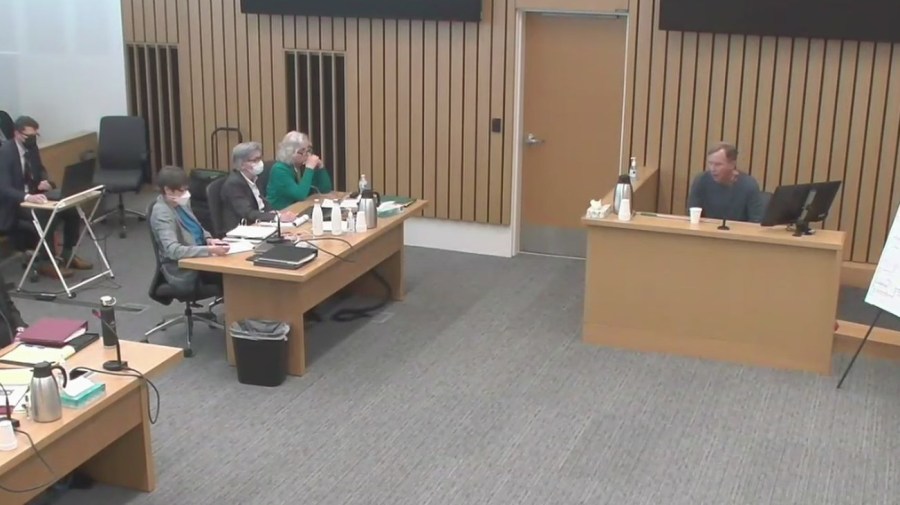PORTLAND, Ore. (KOIN) – Two people who worked closely with Chef Daniel Brophy at the Oregon Culinary Institute before he was murdered say he was passionate about cooking and teaching and loved to work. They spoke in court Thursday morning on the fourth day of the Murder trial for Nancy Crampton Brophy.
Crampton Brophy, an Oregon romance novelist, is charged with murder in the death of her husband, Daniel Brophy. Brophy was found fatally shot at the Oregon Culinary Institute on June 2, 2018.
The first person to take the stand Thursday morning was Brian Wilke. He was the executive chef and president at the Oregon Culinary Institute when Daniel was killed in 2018 and up until the school closed in 2020.
Wilke said he’d known Daniel for more than two decades. Daniel was his instructor at the Western Culinary Institute in the ‘90s. They then worked together at that school and continued to work together when the school changed names to Le Cordon Bleu. When Wilke opened the Oregon Culinary Institute, Daniel was one of the first instructors he hired.
“He was an incredible instructor, incredible knowledge,” Wilke said. He said Daniel’s teaching style was consistent over the years and he was a “pretty unique individual.”
The two worked together for about 20 years and in that time, Wilke said he doesn’t think Daniel ever missed more than three days of work. He said Daniel was consistent and seemed to really love his job.
The morning of June 2, 2018, Wilke said he was getting ready to drive to the school when he received a call from Paul Woodson Bailey. He drove to OCI immediately and when he arrived he saw a lot of police officers and crime scene tape around the building. He said the pastry instructor who was working that day, Chef Dorothy Sadie Damon, was standing in the parking lot and was “not doing well.” The students were still in the student lounge, waiting to be escorted out of the building by police.
He said he saw Crampton Brophy at the scene and went over to talk to her. At the time, he knew her husband was dead, but didn’t say anything to her.
“I walked up and I lifted the [crime scene] tape for her and she said, ‘This doesn’t sound good, Brian.’ And I said, ‘It’s not good,’” he recalled.
He wanted to get her away from the public, so he walked with her and introduced her to police officers.
He saw her go inside the Portland Police Bureau’s mobile command unit and he said he didn’t say anything else to her before she left that day. Wilke said he called her weekly after the incident to check in on her. In one phone call, he explained to her that since Daniel had died at the school, there were some benefits available to her.
Wilke also answered questions for police officers on June 2 and spent all day near the campus. Later in the day he was allowed inside the school.
As he walked around, Wilke noticed some paper medical garbage left behind by the paramedics and EMTs, but said otherwise, nothing was disturbed or out of place.
He said he knew Daniel was a man of routine and figured he was filling the water jug for the students, as he did every morning, when he was shot.
A defense attorney asked Wilke about the homeless in the area. He said they were never a problem, but at one time, he’d heard there’d been an intruder in a nearby condominium. He said he didn’t know much about the incident and couldn’t remember exactly when it had happened.
Woodson Bailey was the second witness to take the stand Thursday. He worked as the facilities manager and kitchen teaching assistant at OCI. He said he’d known Daniel since he’d started working at OCI in 2006.
Woodson Bailey said there were no security cameras installed in the OCI building when Daniel was killed. He said there was a two-way mirror left in the corner of a room from the building’s last tennant and he would sometimes make an act of cleaning the glass to fool the students into thinking there was a camera, but there wasn’t one.
After Daniel’s death, he said the school installed exterior cameras.
The alarm system on the doors was run by Philips Electronics and instructors all had codes to disarm the door alarm system.
Woodson Bailey said he usually arrived at the school early to do inventory or receive supplies as they were delivered. He said Daniel was also an early riser and enjoyed a routine.

Sometimes in the morning, Daniel would bring in a cart with supplies he’d display to sell to the students. The cart is too big to go through a normal doorway and Wilke said he would usually bring it through the garage door on the storage supply room, which would explain why it was open the day Daniel was killed.
Woodson Bailey said he and Daniel were fairly close. They spent time together outside of school and Woodson Bailey would accompany Daniel’s field trips with his students.
However, even though they were close, Woodson Bailey said he doesn’t remember Daniel ever discussing finances, his plans for retirement, or firearms.
He said when Pioneer Pacific College, which owned Oregon Culinary Institute, became more involved with the school, the budget grew tighter and there were no raises for faculty members.
Still, Woodson Bailey said, no one was forced to stay. They could have left, but people like Daniel stayed because they were passionate about their jobs.
“He knew and felt that if you came into this industry for money, you were going to be greatly disappointed,” Woodson Bailey said.